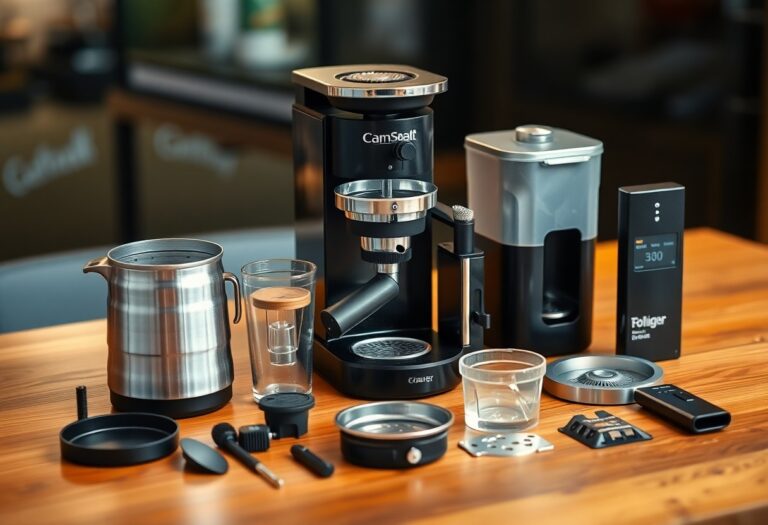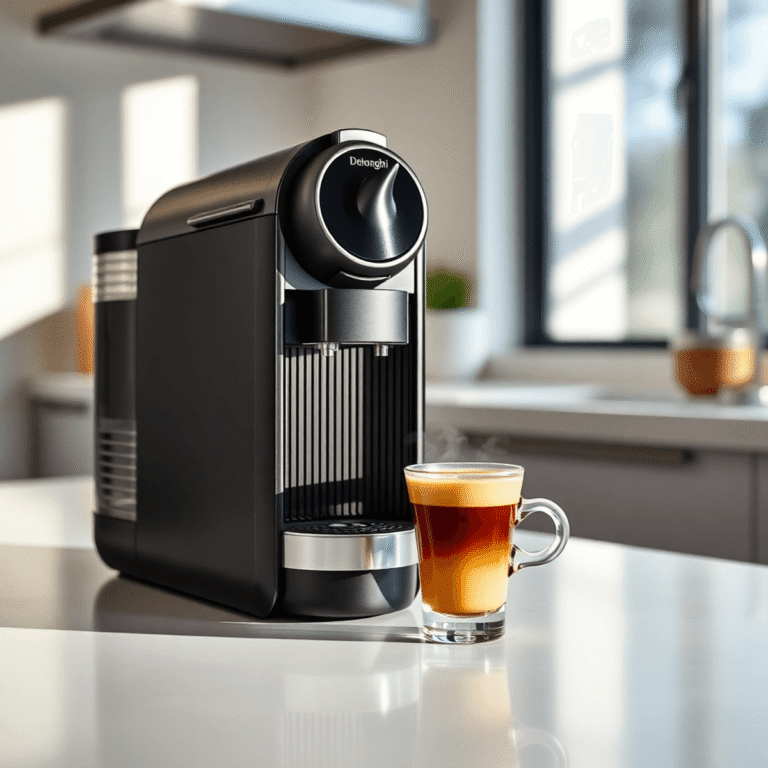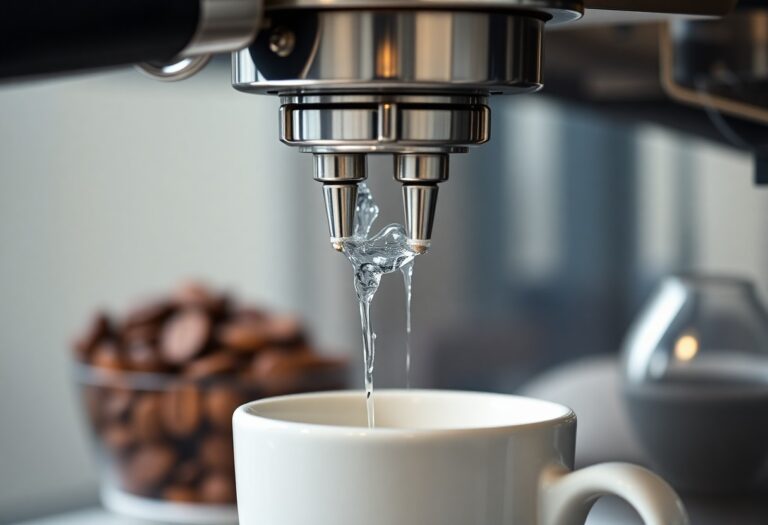What to Descale a Coffee Machine With – Descaling Agents
Just as your coffee machine works hard to brew your favorite beverages, it also needs regular maintenance to function optimally. Descaling agents are crucial for removing mineral buildup that can affect taste and machine performance. You have several options, from commercial descalers specifically designed for coffee machines to natural alternatives like vinegar or citric acid. Choosing the right descaling agent is vital to ensure your machine remains in good condition and continues to deliver great coffee. For a deeper dive, check out We Set Out to Find the Best Coffee-Maker Cleaner.

Key Takeaways:
- Common descaling agents include vinegar, citric acid, and commercial descaling solutions specifically designed for coffee machines.
- Vinegar is an effective and natural descaler, but it may leave a lingering taste if not rinsed thoroughly.
- Citric acid is a gentle yet powerful alternative that is less likely to impact the flavor of coffee when properly rinsed.
- Commercial descaling products are formulated for optimal results and often come with instructions tailored for different coffee machine brands.
- The descaling frequency depends on water hardness and usage, typically every 1 to 3 months for best machine performance.

The Science of Scaling: Why Descaling is Essential
Scaling occurs when minerals, primarily calcium and magnesium, accumulate inside your coffee machine over time. This build-up is a natural consequence of using hard water, leading to blockages and reduced efficiency. Regular descaling protects your machine and ensures it operates at peak performance. When you neglect this maintenance task, layers of scale can develop, ultimately affecting your coffee quality and the machine’s functionality.
The Impact of Mineral Build-up on Coffee Flavor
Minerals from scaling can severely alter the taste of your coffee. A build-up can lead to a flat or bitter flavor, as water struggles to extract the imperative oils and compounds from the coffee grounds. If you’re aiming for a rich, balanced cup, maintaining your machine’s cleanliness is non-negotiable.
How Scaling Affects the Performance and Lifespan of Your Machine
Neglecting to descale contributes to a range of performance issues in your coffee machine. Increased energy usage is common, as the machine must work harder to maintain temperature and pressure. Over time, this extra strain can diminish the overall lifespan of the appliance, potentially resulting in costly repairs or replacements.
As scale deposits accumulate, they can obstruct water lines, leading to uneven brewing temperatures and inconsistent coffee extraction. This not only compromises the flavor but also puts unnecessary stress on components like the heating element and pump. Eventually, the prolonged impact of scaling can shorten your machine’s lifespan significantly, sometimes by several years, which is why addressing scaling regularly can save you both time and money in the long run.
Common Descaling Agents: The Good, the Bad, and the Effective
Descaling your coffee machine involves choosing the right agent to effectively remove mineral buildup. Among the options, some are praised for their effectiveness, while others may come with potential drawbacks. Understanding the differences can help you optimize your cleaning routine, ensuring that your machine maintains performance and longevity. Natural alternatives like vinegar and citric acid offer eco-friendly solutions, whereas commercial descalers can provide fast results but may contain harsh chemicals. Each option presents unique benefits and downsides that you should consider before making your decision.
Natural Alternatives: Vinegar and Citric Acid
Using natural alternatives like vinegar and citric acid can be an effective and environmentally friendly way to descale your coffee machine. Vinegar is a common choice due to its acidity, which dissolves mineral deposits, but it can leave a lingering smell. Citric acid, derived from citrus fruits, is highly effective in breaking down limescale while also leaving no unpleasant aftertaste or odor. Both options present cost-effective solutions but may require multiple applications for optimal results.
Commercial Descalers: Pros and Cons
Commercial descalers are specifically formulated to remove mineral buildup efficiently and are often faster acting compared to natural methods. However, they may contain harsh chemicals that could be detrimental to some machine parts or leave residues if not rinsed thoroughly. Balancing speed and safety is key when choosing this route. Consider the following points to weigh the pros and cons of commercial descalers:
| Pros | Cons |
|---|---|
| Fast acting and efficient | May contain harmful chemicals |
| Specifically designed for coffee machines | Potential residue if not rinsed properly |
| Convenient and easy to use | Can be more expensive than natural options |
| Consistency in results | Some could be harsh on certain materials |
| Available in various formats (liquid, tablet) | Risk of overuse affecting machine lifespan |
Exploring commercial descalers often leads to a trade-off between efficiency and safety. While they promise quick results in tackling tough limescale, balancing their effectiveness with potential risks is vital. Always follow the manufacturer’s instructions and consider how often you should use descalers to protect your coffee machine from damage while ensuring it operates at peak performance.
Choosing the Right Descaling Agent for Your Coffee Machine
Selecting a descaling agent depends on the material of your coffee machine and your personal preferences. For example, Cleaning a Coffee Pot: Vinegar vs. Descaling Solution highlights that while vinegar is a natural alternative, it may not be suitable for all models and could lead to corrosion over time. Opt for agents designed specifically for your equipment to ensure longevity and efficiency.
Compatibility with Different Coffee Machine Types
Each coffee machine type may require specific descaling agents to maintain functionality. Here’s a quick look at compatible options:
| Coffee Machine Type | Recommended Descaling Agent |
|---|---|
| Drip Coffee Makers | Vinegar or Citric Acid |
| Espresso Machines | Commercial Descaling Solution |
| Single-Serve Pod Machines | Vinegar or Commercial Solutions |
| Manual Coffee Brewers | Citric Acid |
| French Press | Hot Water Rinse |
Knowing the right agent enhances the cleaning process and ensures optimal brewing performance.
Evaluating Environmental and Health Considerations
The choice of descaling agent can have implications for your health and the environment. Consider using eco-friendly solutions that minimize chemical exposure. For instance, natural alternatives like citric acid and vinegar generally have less impact than harsh commercial cleaners.
Eco-friendly descalers often boast biodegradable ingredients that are safe for your health and the environment. Utilizing such products can lead to less chemical runoff in waterways and ensure that you’re not introducing harmful substances into your daily routine. Furthermore, choosing a natural solution aligns with sustainable living practices, beneficial for both you and the planet.
Step-by-Step Guide: How to Effectively Descales Your Coffee Machine
| 1. Prepare Your Machine for Descaling | Empty the water reservoir and remove any coffee grounds from the machine. |
| 2. Mix Descaling Solution | Follow instructions on your descaling agent to mix the solution appropriately. |
| 3. Run the Descaling Cycle | Activate the descaling program if available or manually run the solution through the machine. |
| 4. Rinse Thoroughly | Run multiple cycles of clean water through the machine to eliminate any residual solution. |
| 5. Reassemble Your Machine | Put back any components removed and fill the reservoir with fresh water. |
Preparing Your Machine for Descaling
Start by ensuring your coffee machine is turned off and unplugged. Remove the water reservoir, discarding any leftover water. Take out the coffee grounds, including any filters, to prevent contamination during the cleaning process. This pre-descaling preparation allows the descaling solution to work effectively without interference from residual coffee particles.
Proper Techniques for Optimal Cleaning Results
Utilizing proper techniques enhances the efficiency of your descaling process, ensuring all limescale deposits are thoroughly removed. Begin by mixing the descaling solution with water in accordance to the manufacturer’s instructions, factoring in your machine’s size. While running the descaling cycle, make sure to not skip any settings and allow the solution to sit for a specified period if directed. Following the descaling, running several cycles of fresh water through the machine guarantees that any chemical residues are fully washed away, keeping your coffee safe and flavorful.
For best practices, monitor the entire descaling process closely. Some machines come equipped with specific indicators to signal when descaling is necessary. Always heed these warnings as leaving buildup can lead to clogs and diminish the functionality of your coffee machine. With consistent attention to technique, you invite longevity and optimal performance from your brewer.
Ongoing Maintenance: Tips for Keeping Your Coffee Machine Scale-Free
Maintaining your coffee machine’s efficiency involves regular attention to prevent the buildup of scale. Integrating descaling agents into your maintenance routine is necessary, along with periodic inspections to catch any early signs of buildup. Consider using filtered water that minimizes impurities while also utilizing a monthly or bi-monthly descaling schedule to keep your coffee machine operating at peak performance. Any coffee lover knows that these small actions contribute significantly to the longevity and flavor quality of your brews.
- Descaling agents should be used regularly.
- Inspect your machine for signs of scale buildup.
- Utilize water filters to improve water quality.
- Adhere to a maintenance routine for optimal machine performance.
Regular Cleaning Routines
Incorporating a regular cleaning routine is vital for keeping your coffee machine scale-free. This should include daily rinsing of the brew basket, ensuring coffee residues are minimized, and using manufacturer-recommended cleaning procedures. A thorough clean at least once a month eliminates potential source points for any future buildup.
Water Quality and Its Role in Scale Prevention
Water quality plays a significant role in preventing scale accumulation in your coffee machine. Using filtered or bottled water that is low in calcium and magnesium helps minimize the rate of limescale deposits. Tap water, high in these minerals, can inadvertently contribute to faster scale formation. Furthermore, consistently using the same quality of water ensures that your machine performs efficiently over time, resulting in better-tasting coffee.
Investing in a quality water filter or purification system can dramatically improve your overall coffee experience. Depending on your location, tap water can contain varying levels of minerals, sometimes exceeding recommended levels. Choosing water specifically designed for brewing, such as distilled or specially blended options, also reduces the chances of scale buildup. This not only enhances the taste of your coffee but ensures your machine runs smoothly for years to come, requiring less frequent descaling.
Final Words
So, when it comes to descaling your coffee machine, choosing the right descaling agent is key to maintaining its performance. You can opt for commercial descalers specifically formulated for coffee machines, or utilize natural alternatives like vinegar or citric acid. Whichever option you select, following the manufacturer’s instructions will ensure you effectively remove mineral buildup, prolonging the life of your coffee maker. Regular descaling will enhance the flavor of your beverages and keep your machine running smoothly, so make it a part of your maintenance routine.
FAQ
Q: What is descaling, and why is it important for a coffee machine?
A: Descaling is the process of removing mineral buildup, particularly calcium and lime, from the internal components of a coffee machine. This buildup occurs over time, especially if you use hard water. Regular descaling is important because it helps maintain the performance of the machine, enhances the flavor of the coffee, and extends the lifespan of the device by preventing damage to electrical components and filters.
Q: What types of descaling agents can be used for coffee machines?
A: There are several effective descaling agents available for coffee machines. These include commercial descaling solutions specifically formulated for coffee machines, white vinegar, and citric acid. Commercial products often provide instructions for optimal use. If you choose to use vinegar or citric acid, it’s important to rinse the machine thoroughly afterwards to eliminate any lingering taste or odor.
Q: How often should I descale my coffee machine?
A: The frequency of descaling depends on the hardness of your water and how often you use the machine. Generally, it is recommended to descale every 1 to 3 months. If you notice slower brewing times, reduced water flow, or changes in coffee flavor, these can be indicators that descaling is needed sooner. Always refer to your machine’s user manual for specific guidance.
Q: Can I use household items like lemon juice to descale my coffee machine?
A: Yes, lemon juice can be used as a natural descaling agent due to its acidic properties, similar to citric acid. However, it’s less effective than dedicated descaling solutions or vinegar. If you choose to use lemon juice, ensure that you thoroughly run clean water through the machine afterward to prevent any residual taste from affecting your coffee.
Q: What steps should I follow when descaling my coffee machine?
A: To descale your coffee machine, start by gathering your descaling agent. If using a commercial solution, follow the manufacturer’s instructions. If using vinegar or citric acid, mix it with water in the machine’s water reservoir. Run a brew cycle without coffee grounds, then empty the pot. Follow this by running at least two cycles of plain water to flush out any remaining solution. Lastly, wipe down the exterior and ensure the machine is clean for future use.







